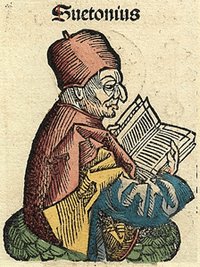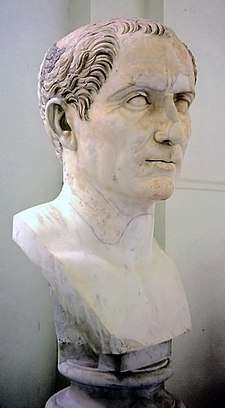Suetonius
Gaius Suetonius Tranquillus (Latin: [ˈɡaːi.ʊs sweːˈtoːni.ʊs traŋˈkᶣɪlːʊs]), commonly known as Suetonius (/swɪˈtoʊniəs/; c. 69 – after 122 AD),[3] was a Roman historian who wrote during the early Imperial era of the Roman Empire.
Suetonius | |
|---|---|
 A generalized representation of Suetonius from the 15th-century Nuremberg Chronicle[2] | |
| Born | Gaius Suetonius Tranquillus c. 69 AD |
| Died | After c. 122 AD |
| Occupation | Secretary, historian |
| Genre | Biography |
| Subject | History, biography, oratory |
| Literary movement | Silver Age of Latin |
| Notable works | The Lives of the Twelve Caesars |
His most important surviving work is a set of biographies of twelve successive Roman rulers, from Julius Caesar to Domitian, entitled De Vita Caesarum. Other works by Suetonius concern the daily life of Rome, politics, oratory, and the lives of famous writers, including poets, historians, and grammarians. A few of these books have partially survived, but many have been lost.
Life
Gaius Suetonius Tranquillus was probably born about 69 AD, a date deduced from his remarks describing himself as a "young man" twenty years after Nero's death. His place of birth is disputed, but most scholars place it in Hippo Regius, a small north African town in Numidia, in modern-day Algeria.[4] It is certain that Suetonius came from a family of moderate social position, that his father, Suetonius Laetus,[5] was a tribune belonging to the equestrian order (tribunus angusticlavius) in Legio XIII Gemina, and that Suetonius was educated when schools of rhetoric flourished in Rome.
Suetonius was a close friend of senator and letter-writer Pliny the Younger. Pliny describes him as "quiet and studious, a man dedicated to writing." Pliny helped him buy a small property and interceded with the Emperor Trajan to grant Suetonius immunities usually granted to a father of three, the ius trium liberorum, because his marriage was childless.[6] Through Pliny, Suetonius came into favour with Trajan and Hadrian. Suetonius may have served on Pliny’s staff when Pliny was Proconsul of Bithynia and Pontus (northern Asia Minor) between 110 and 112. Under Trajan he served as secretary of studies (precise functions are uncertain) and director of Imperial archives. Under Hadrian, he became the Emperor's secretary. But Hadrian later dismissed Suetonius for the latter's alleged affair with the empress Sabina.[7][8]
Works
The Twelve Caesars

He is mainly remembered as the author of De Vita Caesarum—translated as The Life of the Caesars although a more common English title is The Lives of the Twelve Caesars or simply The Twelve Caesars—his only extant work except for the brief biographies and other fragments noted below. The Twelve Caesars, probably written in Hadrian's time, is a collective biography of the Roman Empire's first leaders, Julius Caesar (the first few chapters are missing), Augustus, Tiberius, Caligula, Claudius, Nero, Galba, Otho, Vitellius, Vespasian, Titus and Domitian. The book was dedicated to his friend Gaius Septicius Clarus, a prefect of the Praetorian Guard in 119.[9] The work tells the tale of each Caesar's life according to a set formula: the descriptions of appearance, omens, family history, quotes, and then a history are given in a consistent order for each Caesar. He recorded the earliest accounts of Julius Caesar's epileptic seizures.
Other works
Partly extant
- De Viris Illustribus ("On Famous Men" — in the field of literature), to which belong:
- De Illustribus Grammaticis ("Lives of the Grammarians"; 20 brief lives, apparently complete)
- De Claris Rhetoribus ("Lives of the Rhetoricians"; 5 brief lives out of an original 16 survive)
- De Poetis ("Lives of the Poets"; the life of Virgil, as well as fragments from the lives of Terence, Horace and Lucan, survive)
- De Historicis ("Lives of the historians"; a brief life of Pliny the Elder is attributed to this work)
- Peri ton par' Hellesi paidion ("Greek Games")
- Peri blasphemion ("Greek Terms of Abuse")
The two last works were written in Greek. They apparently survive in part in the form of extracts in later Greek glossaries.
Lost works
The below listed lost works of Suetonius are from the foreword written by Robert Graves in his translation of the Twelve Caesars.[10]
- Royal Biographies
- Lives of Famous Whores
- Roman Manners and Customs
- The Roman Year
- The Roman Festivals
- Roman Dress
- Greek Games
- Offices of State
- On Cicero’s Republic
- Physical Defects of Mankind
- Methods of Reckoning Time
- An Essay on Nature
- Greek Objurations
- Grammatical Problems
- Critical Signs Used in Books
The introduction to Loeb edition of Suetonius, translated by J. C. Rolfe, with an introduction by K. R. Bradley, references the Suda with the following titles:
- On Greek games
- On Roman spectacles and games
- On the Roman year
- On critical signs in books
- On Cicero's Republic
- On names and types of clothes
- On insults
- On Rome and its customs and manners
The volume then goes on to add other titles not testified within the Suda.
- On famous courtesans
- On kings
- On the institution of offices
- On physical defects
- On weather signs
- On names of seas and rivers
- On names of winds
Two other titles may also be collections of some of the aforelisted:
- Pratum (Miscellany)
- On various matters
Editions
- Edwards, Catherine Lives of the Caesars. Oxford World’s Classics. (Oxford University Press, 2008).
- Robert Graves (trans.), Suetonius: The Twelve Caesars (Harmondsworth, Middlesex, England: Penguin Books, Ltd, 1957)
- Donna W. Hurley (trans.), Suetonius: The Caesars (Indianapolis/London: Hackett Publishing Company, 2011).
- J.C. Rolfe (trans.), Lives of the Caesars, Volume I (Loeb Classical Library 31, Harvard University Press, 1997).
- J.C. Rolfe (trans.), Lives of the Caesars, Volume II (Loeb Classical Library 38, Harvard University Press, 1998).
- C. Suetonii Tranquilli De vita Caesarum libros VIII et De grammaticis et rhetoribus librum, ed. Robert A. Kaster (Oxford: 2016).
See also
Notes
- The same woodcut is used throughout the chronicle for writers, priests and philosophers of different time periods and different national backgrounds. See Nuremberg Chronicle, digital edition (University of Cambridge), ff. 40v, 59r, 80v, 82v, 118r, 158v, 227r, and 240r.
- The same woodcut is used throughout the chronicle for writers, priests and philosophers of different time periods and different national backgrounds. See Nuremberg Chronicle, digital edition (University of Cambridge), ff. 40v, 59r, 80v, 82v, 118r, 158v, 227r, and 240r.
- The Editors of Encyclopaedia Britannica. "Suetonius". Encyclopædia Britannica. Cambridge University Press. Retrieved 15 May 2017.
- Suetonius (1997). Lives of the Caesars. 1. Cambridge: Harvard University Press. Loeb Classical Library. p. 4.
- Suetonius. Vita Othonis. 10, 1.
- Pliny the Younger. "10.95". Letters.
- Chisholm, Hugh, ed. (1911). . Encyclopædia Britannica. 26 (11th ed.). Cambridge University Press.
- Hadrianus. "11:3". Historia Augusta.
claims that Hadrian "removed from office Septicius Clarus, the prefect of the guard, and Suetonius Tranquillus, the imperial secretary, and many others besides, because without his consent they had been conducting themselves toward his wife, Sabina, in a more informal fashion than the etiquette of the court demanded."
- Reynolds, Leighton Durham (1980). Texts and Transmission: A Survey of the Latin Classics. Oxford: Clarendon Press. p. 509. ISBN 9780198144564.
The dedication, in the lost preface, is recorded by a sixth-century source when the text was still complete
- Suetonius (1957). "Foreword". In Rives, James (ed.). Suetonius: The Twelve Caesars. Translated by Graves, Robert (1st ed.). Hamondsworth, Middlesex, England: Penguin Books. p. 7.
References
- Barry Baldwin, Suetonius: Biographer of the Caesars. Amsterdam: A. M. Hakkert, 1983.
- Gladhill, Bill. “The Emperor's No Clothes: Suetonius and the Dynamics of Corporeal Ecphrasis.” Classical Antiquity, vol. 31, no. 2, 2012, pp. 315–348.
- Lounsbury, Richard C. The Arts of Suetonius: An Introduction. Frankfurt: Lang, 1987.
- Mitchell, Jack “Literary Quotation as Literary Performance in Suetonius.” The Classical Journal, vol. 110, no. 3, 2015, pp. 333–355
- Newbold, R.F. “Non-Verbal Communication in Suetonius and ‘The Historia Augusta:' Power, Posture and Proxemics.” Acta Classica, vol. 43, 2000, pp. 101–118.
- Power, Tristan and Roy K. Gibson (ed.), Suetonius, the Biographer: Studies in Roman Lives. Oxford; New York: Oxford University Press, 2014
- Syme, Ronald. "The Travels of Suetonius Tranquillus." Hermes 109:105–117, 1981.
- Trentin, Lisa. “Deformity in the Roman Imperial Court.” Greece & Rome, vol. 58, no. 2, 2011, pp. 195–208.
- Trevor, Luke “Ideology and Humor in Suetonius' ‘Life of Vespasian’ 8.” The Classical World, vol. 103, no. 4, 2010, pp. 511–527.
- Wallace-Hadrill, Andrew F. Suetonius: The Scholar and his Caesars. New Haven, CT: Yale Univ. Press, 1983.
- Wardle, David. "Did Suetonius Write in Greek?" Acta Classica 36:91–103, 1993.
- Wardle, David. “Suetonius on Augustus as God and Man.” The Classical Quarterly, vol. 62, no. 1, 2012, pp. 307–326.
- Kaster, Robert A., Studies on the Text of Suetonius’ “De vita Caesarum” (Oxford: 2016).
External links
| Wikiquote has quotations related to: Suetonius |
| Wikisource has original works written by or about: Suetonius |
| Wikimedia Commons has media related to Suetonius. |
| Library resources about Suetonius |
| By Suetonius |
|---|
- The Lives of the Twelve Caesars at LacusCurtius (Latin original, English translation)
- Suetonius' works at Latin Library (Latin)
- Works by Suetonius at Project Gutenberg
- The Lives of the Twelve Caesars at Project Gutenberg (English translation including the Lives Of The Grammarians, Rhetoricians, And Poets)
- Works by or about Suetonius at Internet Archive
- Works by Suetonius at LibriVox (public domain audiobooks)

- Gai Suetoni Tranquilli De vita Caesarum libri III-VI Cornell University Library Historical Monographs Collection.
- Lewis E 195 Vitae XII caesarium (Lives of the twelve caesars), fragment and Book of Hours leaf at OPenn